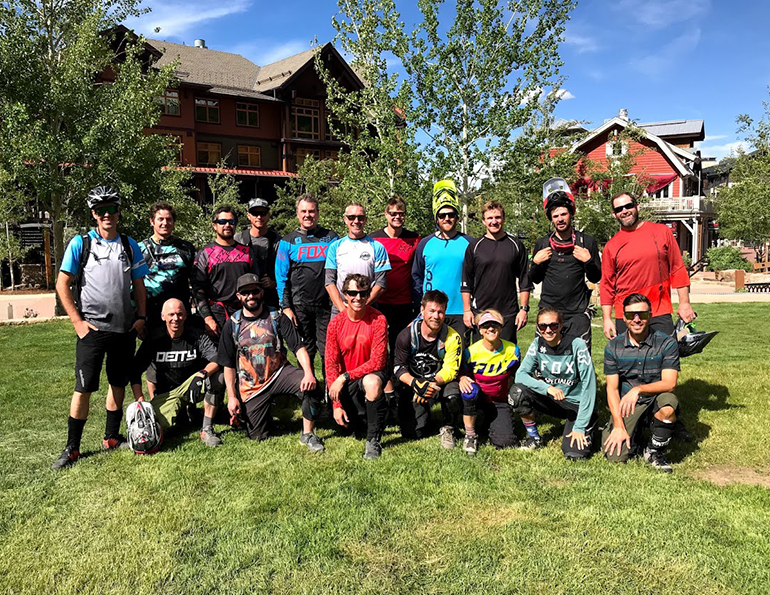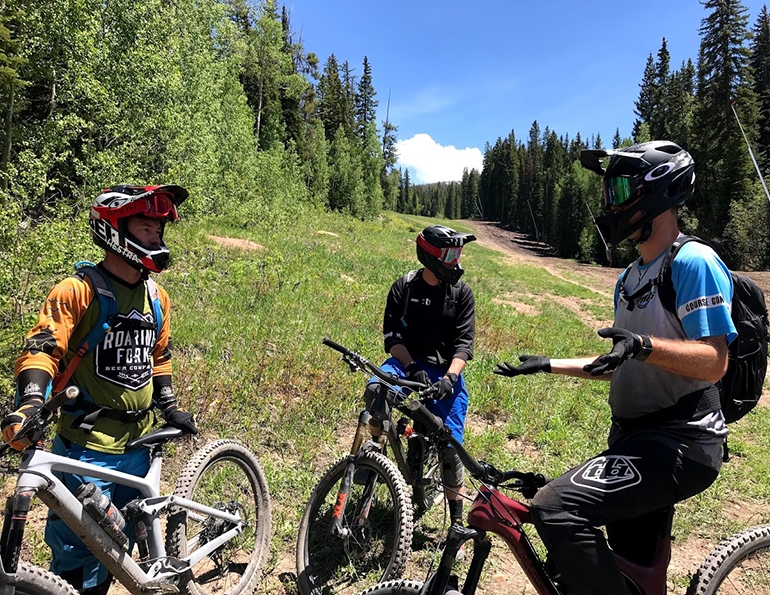At all times, our goal at Aspen/Snowmass is to enhance the customer experience while keeping guests as safe as possible. During the winter, we certify our ski and snowboard instructors, and they teach guests to navigate our wintry terrain safely and happily. When we introduced lift-served bike terrain, we sought ways to offer that same type of experience. We’ve found bike instructor certification to be very beneficial in reaching our goal.
Why Certification?
As with skiing and riding, there are risks associated with mountain biking. The speeds are often higher than cross-country riding, and the margin of error smaller. Unlike skiing and riding, though, there’s the none-too-small matter of friction—in the winter, you fall and slide. In the summer, you fall and stick. We offer bike school to help minimize these risks.
We can't simply offer it, though; we have to sell it. Selling mountain bike lessons is difficult, because guests feel they already know how to ride a bike. Why would they want a lesson? So, we offer “clinics” and “experiences” with our “coaches” or “guides,” and we've enjoyed much greater success with that approach. It may seem like just semantics, but how we position our offerings matters.
To provide consistency among our coaches and clinics, we’ve found certification extremely valuable. Many of our bike instructors are also members of PSIA-AASI, so they know how to teach and recognize the value of certification. We just needed the means to translate that into mountain and downhill biking.
Which Program?
The three main organizations for MTB instructor certification are Terra Method, Bike Instructor Certification Program, and Professional Mountain Bike Instructors Association (PMBIA). Initially, Snowmass used Terra Method. Other Colorado resorts were using it, and it made sense for us to be aligned with other operators in our region.
But Terra Method stopped offering courses in the Colorado region, so we turned to PMBIA. PMBIA has become recognized and respected worldwide by building relationships with bike parks, ski resorts, clubs, and coaching companies alike. It now has members on six continents.
The original PMBI courses began in 2006. They promoted a skill-based teaching method that allowed instructors to be trained and certified to teach in both cross country and downhill settings in one course.
After some refinement, PMBIA certification has become a tool that, in the group's own words, creates “an industry standard that will allow us all, as instructors and guides, to cross many boundaries and borders with consistent methodology, language, and teaching theory. Students are all taught the same modern techniques, with consistent terminology from a variety of presentation styles, regardless of where people take a lesson.”
The Process
PMBIA offers three certification levels. We opted to certify 16 of our coaches with Level 1, which focuses on fundamentals skills and how to teach them to beginner and intermediate riders. It's an introductory course to coaching and guiding that requires that instructors be able to ride to an intermediate skill level in a chairlift-accessed bike park or cross-country trail network.
We have found the three-day Level 1 course to be invaluable to our coaches. The course is designed to take place both in a bike park and outside of it, such as on a cross-country trail network.
Of course, on day one of our certification, it snowed—and the bike park was closed. But this turn of events only added to our learning, as the weather forced us to get out of the familiar space of our park and to explore our cross-country options.
The first day focused on the coaches’ skills by introducing them to the fundamentals and teaching methodology, which made them better riders. Often, certification assessments focus on teaching, but the focus on riding really helped us get into the heart of the content.
The next two days were spent in the Snowmass Bike Park, where our coaches spent more time getting familiar with the content and practiced teaching sample progressions.
After the certification is complete, PMBIA provides resources online in the form of a manual and course booklet. Our certified coaches can access this information at any time, and even carry a copy on their smartphones.
The Benefits
We reaped myriad benefits from the certification process. For one, because the process helped us as both students and coaches, we rethought how we approach progression. One change: We’ve taken cornering out of our beginner progression. Cornering involves blending a lot of skills at once, and it’s rather complicated. By improving fundamental skills instead of complex skills, we can make certain that the guest learning progression is safer, efficient, and successful.
As well, our beginner trail is 3.8 miles long, and descends approximately 1,800 vertical feet, which can be daunting—to students and teachers. But since our teachers learned how to coach on the same trail, they now have the confidence to get guests on the trail sooner.
Another great benefit is that Snowmass coaches now have a common language, and they can effectively discuss best practices among themselves and with other coaches.
Another benefit is a reduction in injuries. PMBIA certification includes risk management and safety, which helped our coaches adapt their lessons to the guests' learning styles and skill levels, making lessons safer and more fun. Yes, there are still guest injuries, but the frequency has gone down since we underwent certification. (Unfortunately, for reasons every risk manager will understand, we cannot share exact numbers or data).
Ultimately, by certifying our team, are instructors are trained on understanding and applying the fundamental principles of mountain biking, which has greatly improved the guest experience. That makes certification a win for everyone.

COVID-19 Adaptations
PMBIA operates single- and multi-day certification programs in-person only. While it has sessions scheduled around the world through December, the decision on whether to conduct each course is being evaluated on a case by case basis, in consideration of travel restrictions, the travel required to get to a course location, local gathering restrictions, the level of risk of contagion for that area, and other factors.






